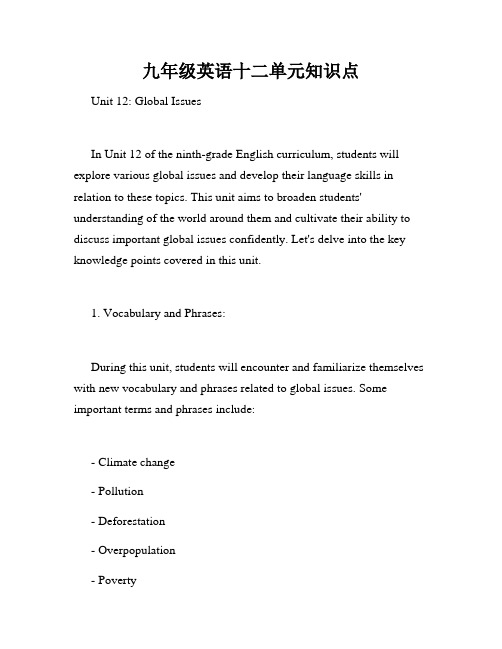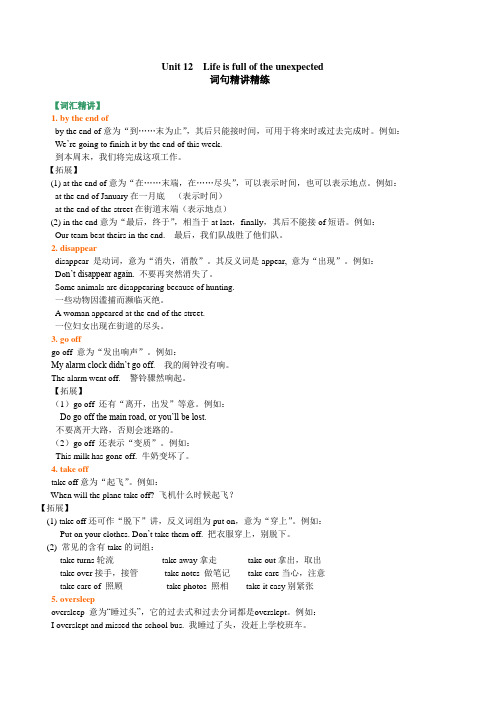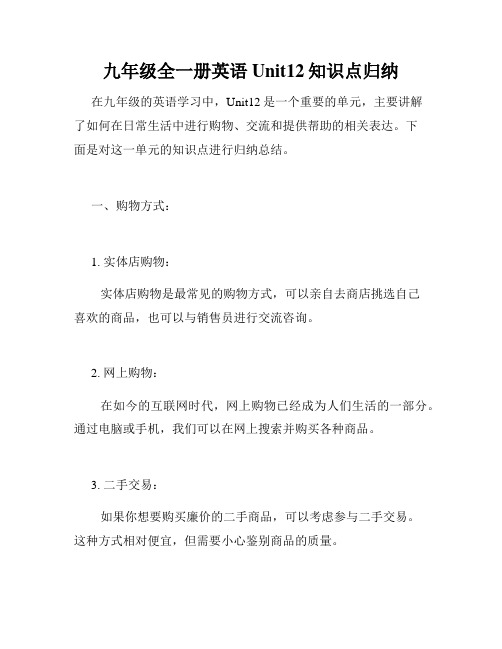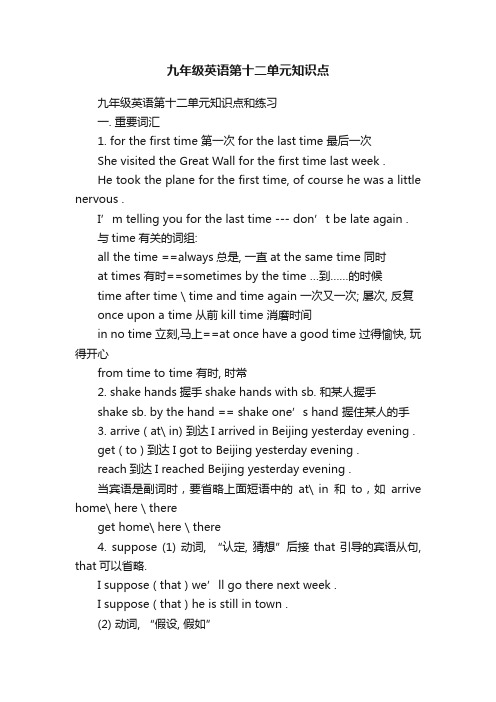英语九年级上册2d知识点第12单元
九年级英语十二单元知识点

九年级英语十二单元知识点Unit 12: Global IssuesIn Unit 12 of the ninth-grade English curriculum, students will explore various global issues and develop their language skills in relation to these topics. This unit aims to broaden students' understanding of the world around them and cultivate their ability to discuss important global issues confidently. Let's delve into the key knowledge points covered in this unit.1. Vocabulary and Phrases:During this unit, students will encounter and familiarize themselves with new vocabulary and phrases related to global issues. Some important terms and phrases include:- Climate change- Pollution- Deforestation- Overpopulation- Poverty- Natural disasters- Renewable energy- Sustainable development- Access to clean water- Environmental conservation2. Grammar:Grammar plays a vital role in enhancing language proficiency. In Unit 12, students will revise and expand their understanding of several key grammatical concepts. These grammar topics include:- Passive voice: Students will learn how to form passive sentences and understand their usage in discussing global issues. For example, "Pollution is caused by human activities."- Conditional sentences: Students will practice constructing sentences with different conditional structures to express hypothetical situations regarding global issues. For instance, "If we don't take action against climate change, the consequences will be severe."- Modal verbs: Students will be introduced to various modal verbs such as can, could, may, might, should, and would, which arecommonly used when discussing global issues. For example, "We should reduce our carbon footprint to mitigate climate change."3. Reading and Listening Comprehension:In this unit, students will read and listen to authentic materials related to global issues. These materials will help improve their comprehension skills while being exposed to different text types, including news articles, interviews, and speeches. Students will practice identifying main ideas, supporting details, and making inferences from the text.4. Speaking and Writing:Unit 12 provides ample opportunities for students to develop their speaking and writing skills. They will engage in discussions, debates, and collaborative activities centered around global issues. Some speaking and writing tasks include:- Presentations: Students will prepare and deliver presentations on specific global issues, sharing their views, and proposing possible solutions.- Opinion essays: Students will be assigned to write opinion essays expressing their thoughts on a chosen global issue and supporting their arguments with evidence and examples.- Group projects: Students will collaborate with their peers to research and create projects showcasing the impact of global issues and potential ways to address them.5. Cultural Awareness:Throughout this unit, students will gain a deeper understanding of global issues from different cultural perspectives. They will examine how these issues affect communities around the world and explore cultural responses to these challenges.Conclusion:Unit 12 of the ninth-grade English curriculum provides students with a valuable opportunity to explore and understand global issues while improving their language skills. By studying the vocabulary, grammar, reading comprehension, speaking, and writing related to these issues, students will become more aware of the world aroundthem and develop their ability to participate in meaningful discussions on global topics.。
九年级英语第十二单元知识点总结

Unit 12: Making a Difference1. Vocabulary:- Philanthropy: the desire to promote the welfare of others, expressed especially by the generous donation of money to good causes.- Volunteer: a person who freely offers to take part in an enterprise or undertake a task.- Fundraising: the process of gathering voluntary contributions of money or other resources, by requesting donations from individuals, businesses, charitable foundations, or governmental agencies.- Charity: an organization set up to provide help and raise money for those in need.- Non-profit: not established for the purpose of making a profit.- Initiative: the power or opportunity to act or take charge before others do.- Campaign: a series of planned activities designed to achieve a particular aim.2. Grammar:- Infinitives: "to" + base form of the verb, used as a noun, adjective, or adverb.- Gerunds: verb forms ending in "-ing", used as nouns.- Passive voice: the subject receives the action of the verb, rather than performing it.- Modals: auxiliary verbs that express ability, necessity, possibility, permission, or prohibition.- Connectives: words or phrases used to join words, phrases, or clauses.3. Language Functions:- Expressing opinions and beliefs.- Giving reasons and justifications.- Supporting and opposing ideas.- Taking part in discussions and debates.- Asking for and giving advice.4. Reading Skills:- Skimming: quickly going through a text to get a general idea of the main points.- Scanning: rapidly searching for specific information in a text.- Identifying the main idea and supporting details.- Understanding vocabulary in context.- Making inferences and drawing conclusions.- Analyzing the author's purpose and tone.5. Writing Skills:- Writing a persuasive essay: using logical arguments and evidence to convince the reader of a particular viewpoint.- Organizing ideas effectively with clear paragraphs and logical transitions.- Using formal language and appropriate tone.- Editing and revising for coherence, clarity, and grammatical accuracy.6. Speaking Skills:- Initiating and sustaining conversations on familiar topics.- Expressing opinions clearly and confidently.- Supporting arguments with relevant examples and evidence.- Active listening and responding appropriately to others.- Participating in group discussions and making meaningful contributions.7. Cultural Awareness:- Understanding and appreciating the importance of volunteer work in different cultures.- Recognizing the impact of philanthropy on society.- Learning about charitable organizations and their activities.。
人教版九年级英语第12单元知识讲解

Unit 12 Life is full of the unexpected词句精讲精练【词汇精讲】1. by the end ofby the end of意为“到……末为止”,其后只能接时间,可用于将来时或过去完成时。
例如:We’re going to finish it by the end of this week.到本周末,我们将完成这项工作。
【拓展】(1) at the end of意为“在……末端,在……尽头”,可以表示时间,也可以表示地点。
例如:at the end of January在一月底(表示时间)at the end of the street在街道末端(表示地点)(2) in the end意为“最后,终于”,相当于at last,finally,其后不能接of短语。
例如:Our team beat theirs in the end.最后,我们队战胜了他们队。
2. disappeardisappear 是动词,意为“消失,消散”。
其反义词是appear, 意为“出现”。
例如:Do n’t disappear again. 不要再突然消失了。
Some animals are disappearing because of hunting.一些动物因滥捕而濒临灭绝。
A woman appeared at the end of the street.一位妇女出现在街道的尽头。
3. go offgo off 意为“发出响声”。
例如:My alarm clock didn’t go off. 我的闹钟没有响。
The alarm went off. 警铃骤然响起。
【拓展】(1)go off 还有“离开,出发”等意。
例如:Do go off the main road, or you’ll be lost.不要离开大路,否则会迷路的。
(2)go off 还表示“变质”。
例如:This milk has gone off. 牛奶变坏了。
九年级全一册英语Unit12知识点归纳

九年级全一册英语Unit12知识点归纳在九年级的英语学习中,Unit12是一个重要的单元,主要讲解了如何在日常生活中进行购物、交流和提供帮助的相关表达。
下面是对这一单元的知识点进行归纳总结。
一、购物方式:1. 实体店购物:实体店购物是最常见的购物方式,可以亲自去商店挑选自己喜欢的商品,也可以与销售员进行交流咨询。
2. 网上购物:在如今的互联网时代,网上购物已经成为人们生活的一部分。
通过电脑或手机,我们可以在网上搜索并购买各种商品。
3. 二手交易:如果你想要购买廉价的二手商品,可以考虑参与二手交易。
这种方式相对便宜,但需要小心鉴别商品的质量。
二、购物时的交流:1. 询问价格:如果你对某个商品感兴趣,可以使用以下表达方式询问价格: - How much is this/that?- How much does it cost?- What's the price?2. 购买商品:当你决定购买某个商品时,可以使用以下表达方式:- I'll take this/that one.- I want to buy this/that one.- I'd like to purchase this/that one.3. 比较商品:在购物时,我们常常需要比较不同商品的特点和价格。
以下表达方式可以帮助你进行比较:- Which one is cheaper, this one or that one?- What's the difference between this one and that one?- I think this one is better because...4. 付款方式:购物时,需要选择合适的付款方式。
以下是常见的付款方式: - Can I pay in cash?- Do you accept credit cards?- Can I use mobile payment like Alipay or WeChat Pay?5. 请求帮助:如果你在购物过程中遇到问题,可以用以下表达方式请求帮助:- Excuse me, can you help me?- Could you please assist me?- I need your help.三、购物中的礼貌用语:1. 感谢和道别:在购物过程中,我们要学会用礼貌的方式表达感谢和道别: - Thank you for your help.- Thanks a lot.- Have a nice day!2. 道歉和请求:如果我们在购物中犯了错或者需要别人帮助,要学会道歉和请求:- I'm sorry for the inconvenience.- Could you please help me with this?- I apologize for the mistake.四、购物时遇到的问题和解决办法:1. 商品不满意:如果购买的商品有质量问题或者与描述不符,可以进行退货或者换货:- I want to return this product because it's broken.- This item is not what I expected. Can I exchange it for another one?- Can I have a refund?2. 付款问题:在付款时可能会出现问题,可以寻求帮助解决:- I'm having trouble with the payment. Can you help me?- My credit card is not working. Is there another way to pay?- The payment machine is not giving me a receipt. What should I do?在Unit12的学习中,我们学到了购物的方式、交流技巧以及解决问题的方法,这些知识对我们日常的生活和未来的职业发展都具有重要意义。
九年级英语unit 12的知识点

九年级英语unit 12的知识点Unit 12: Knowledge Points in 9th Grade EnglishIn this unit, we will explore various knowledge points in 9th Grade English. These points are crucial to enhance our understanding and usage of the English language. Let's delve into these topics without further ado.1. Vocabulary Expansion:Expanding our vocabulary is essential to improving our English language skills. Here are some useful strategies to expand our vocabulary:- Reading extensively: Reading books, newspapers, and articles enables us to encounter new words in different contexts.- Creating word lists: Jotting down new words along with their meanings and example sentences helps us remember and review them later.- Using synonyms and antonyms: Identifying synonyms and antonyms for common words enhances our writing and speaking skills.- Learning word roots and affixes: Understanding word roots and common affixes helps us decipher the meanings of unfamiliar words.2. Grammar:Proper grammar usage is vital for effective communication. Let's review a few key grammar concepts:- Verb tenses: Understanding the different verb tenses, such as present, past, and future, allows us to express actions accurately in different time frames.- Subject-verb agreement: Ensuring the subject and verb agree in number and person helps maintain grammatical correctness.- Sentence structure: Mastering the use of subjects, predicates, phrases, and clauses enables us to construct clear and concise sentences.- Modifiers: Knowing how to correctly use adjectives and adverbs enhances the quality of our writing and adds precision to our descriptions.3. Reading Comprehension:Improving our reading comprehension skills is essential for understanding academic texts and gathering information effectively. Here are some strategies to enhance reading comprehension:- Skimming and scanning: Quickly going through the text to get a general idea (skimming) and searching for specific information (scanning) helps in efficient reading.- Identifying main ideas and supporting details: Recognizing the main idea and supporting details allows for a better understanding of the text's overall meaning.- Analyzing text structure: Paying attention to the structure of the passage, such as headings, subheadings, and paragraph organization, aids in understanding the content.- Making inferences: Drawing logical conclusions based on the information provided in the text helps us comprehend implicit meanings.4. Writing Skills:Developing strong writing skills enables us to express our thoughts and ideas clearly. Here are some areas to focus on:- Organizing ideas: Structuring our writing using paragraphs, topic sentences, and supporting details helps convey information effectively.- Using appropriate language and tone: Adapting the language and tone to suit the purpose and audience of our writing ensures clarity and coherence.- Editing and revising: Proofreading our written work for grammar, punctuation, and spelling errors, as well as revising content for clarity and coherence, is crucial for producing high-quality writing.- Incorporating varied sentence structures: Using a mix of simple, compound, and complex sentences adds variety to our writing and improves readability.5. Listening and Speaking Skills:Being able to listen and speak effectively enables successful communication in English. Here are some strategies to improve these skills:- Active listening: Paying attention to the speaker, taking notes, and asking questions for clarification enhances our listening comprehension.- Engaging in conversations: Practicing conversations with peers, teachers, or language partners helps improve fluency and confidence in speaking.- Pronunciation and intonation: Focusing on accurate pronunciation and intonation patterns allows for better understanding and effective communication.- Using supporting language: Using phrases like "Could you repeat that?" or "Can you give me an example?" helps in clarifying and expanding our understanding during conversations.In conclusion, mastering the knowledge points discussed in Unit 12 of 9th Grade English provides the foundation for successful language acquisition. By expanding our vocabulary, improving grammar usage, enhancing reading comprehension, developing writing skills, and sharpening listening and speaking abilities, we progress towards becoming proficient English speakers and writers.。
九年级英语第十二单元2a知识点

九年级英语第十二单元2a知识点Unit 12 Lesson 2a Knowledge PointsIn the 12th Unit of our 9th-grade English course, we are exploring various topics related to technology and how it has shaped our lives. One of the key knowledge points in this unit is the concept of Artificial Intelligence (AI).Artificial Intelligence, often referred to as AI, is a branch of computer science that focuses on creating machines and systems capable of performing tasks that would typically require human intelligence. AI is based on the idea of developing computer systems that can learn, reason, and make decisions independently, without human intervention.AI has become a crucial part of many industries and areas of life. For example, in healthcare, AI is used to analyze large amounts of patient data to help doctors make accurate diagnoses and suggest appropriate treatments. In the field of transportation, AI has enabled the development of self-driving cars, which can navigate and make decisions on the road without the need for a human driver. AI also plays a role in our everyday lives, through virtual personal assistantslike Siri or Alexa, which can understand and respond to human voice commands.One important concept to understand when studying AI is machine learning. Machine learning is a subfield of AI that focuses on creating algorithms and systems that can improve their performance over time without being explicitly programmed. For example, a machine learning system can analyze patterns in data and make predictions or decisions based on those patterns. As the system is exposed to more data, it can continuously improve its accuracy and performance.Another significant concept related to AI is natural language processing (NLP). NLP is about enabling computers to understand and interpret human language. Through NLP, machines can analyze and comprehend human speech, generate human-like responses, and even translate between different languages. NLP has facilitated the development of chatbots and virtual assistants that can communicate with humans in a natural and seamless manner.Ethics is another aspect that needs to be considered when discussing AI. As AI becomes more advanced and integrated into various aspects of our lives, it raises ethical questions and concerns. For example, issues related to privacy and data protection arise when AI systemscollect and analyze personal information. There are also concerns about the potential impact of AI on the job market, as automation replaces certain job functions previously performed by humans. It is crucial to consider these ethical considerations and ensure that AI is developed and used responsibly.In conclusion, the 12th Unit of our 9th-grade English course introduces us to the fascinating world of Artificial Intelligence. We have explored the basic concepts of AI, such as machine learning and natural language processing. We have also considered the practical applications of AI in various industries and discussed the ethical implications of its development and use. By understanding these knowledge points, we can gain a deeper appreciation for the role of AI in our lives and the potential it holds for shaping the future.。
九年级英语第十二单元知识点

九年级英语第十二单元知识点九年级英语第十二单元知识点和练习一. 重要词汇1. for the first time 第一次for the last time 最后一次She visited the Great Wall for the first time last week .He took the plane for the first time, of course he was a little nervous .I’m telling you for the last time --- don’t be late again .与time有关的词组:all the time ==always总是, 一直at the same time 同时at times 有时==sometimes by the time …到……的时候time after time \ time and time again 一次又一次; 屡次, 反复once upon a time 从前kill time 消磨时间in no time 立刻,马上==at once have a good time 过得愉快, 玩得开心from time to time 有时, 时常2. shake hands 握手shake hands with sb. 和某人握手shake sb. by the hand == shake one’s hand 握住某人的手3. arrive ( at\ in) 到达I arrived in Beijing yesterday evening .get ( to ) 到达I got to Beijing yesterday evening .reach到达I reached Beijing yesterday evening .当宾语是副词时,要省略上面短语中的at\ in和to,如arrive home\ here \ thereget home\ here \ there4. suppose (1) 动词, “认定, 猜想”后接that引导的宾语从句, that可以省略.I suppose ( that ) we’ll go there next week .I suppose ( that ) he is still in town .(2) 动词, “假设, 假如”Suppose he be here on time , what shall we do ?(3 ) be supposed to do sth.=== should 应该做某事其否定结构为be not supposed to do sth 不应该做某事Everyone is supposed to wear a seat-belt (安全带) in the car .Teachers are supposed to treat all the students alike .老师应该对所有学生一视同仁.You are not supposed to smoke on the bus .We are not supposed to play football on Sunday .It’s a secret , I’m not supposed to tell you.5.relax 动词, “使轻松, 使休息”Let’s relax ourselves by listening to music .relaxed 形容词, 某人“感到松懈的, 感到放松的”I felt relaxed after the competition .relaxing 形容词, 某物“令人松懈的, 令人轻松的”I like those relaxing country songs .6.drop by 顺便来访He dropped by to see what happened here yesterday .7. make plans to do sth \ plan to do sth. \ make plans for sth. 计划做某事We made plans for the next meeting yesterday .She often makes plans to improve her English .8. without 介词, “无, 没有”(1) without sth. 没有某物A man without a friend is only half a man .She went to work without breakfast this morning .Without air or water , we couldn’t live .(2) without doing sth. 没有做某事She spoke without thinking .He left without saying goodbye .(3) without短语常可转换成状语从句或并列句.Without your help I can’t work out the problem .== If you don’t help me I can’t work out the problem .He went out without saying a word .=== he went out and didn’t say a word .(4) without 短语作定语时, 可以转换为定语从句.Have you seen a man without friends ?== have you seen a man who has no friends ?9. pick up (1) 捡起,拾起It’s a good habit to pick up the little( 2 ) (车辆等) 中途搭人\ 带货The car stopped and picked me up . 10. every time , next time , last time 等表示时间的短语后跟一个从句, 用来作主句的时间状语.Every time I come , I always find he is busy playing computer games .Last time you left the house , you forgot to lock the door .11. point at 指向较近的人或物The teacher is pointing at the map on the wall .point to 指向较远的人或物He pointed to the house on the other side of the river and said, “That’s my home .”point out 指出(方向,要点,错误等)The teacher pointed out many mistakes in my homework .12. go out of one’s way to do sth. 特意(花心血、时间)做某事, 故意做某事He went out of his way to help me .We go out of our way to build our country .13. make sb \ oneself feel at home 使某人感觉在家里, 很随意, 无拘束Sit down and make yourself feel at home .14. first 首先强调动作的先后角度Before I go, I must first change my clothes .at first == at the beginning 起初; 含有“后来不这样了”的意思At first I didn’t like her , but now I do .first of all 首先, 第一; 指按时间顺序处于第一First of all , we must check the number .First of all , let me say how glad I am to be here .above all 首先,最重要的是== the most important of all 强调重要性We must work hard, and above all we must believe thateach of us is able to do something well .after all 毕竟---- I’m sorry. I didn’t do it well .---- Never mind . A fter all, it’s the first time for you to do it .15. 含有up 的词组:stand up 站起来grow up 长大send up 发射climb up 爬上get up 起床pick up 捡起put up 张贴,搭建look up 查找set up 建立eat up 吃关use up 用完cut up切开give up 放弃clean up 清理fix up 修理16.begin with== start off with 以……开始The concert begin with the National Anthem (国歌)Begin with this one and do the others afterwards .We will begin with \ start off with music .end with 以……结尾In his speech, he began with a proverb and ended with a joke .17. 可以充当句子主语的结构:(1) 名词作主语: This picture is beautiful .(2) 代词作主语: I love you .(3) 形容词作主语: The old must be taken good care of .(4) 基数词作主语: Two and three is five .(5) 动名词作主语: Seeing is believing .(6) 动词不定式作主语: To study hard is our duty .(7) 并列结构作主语: Reading and writing are very important .(8) 主语从句作主语: What she did is not yet known .What she says isn’t always true .18. search 指对某处、某地进行搜查或搜索,对人时为搜身。
九年级英语u12的知识点

九年级英语u12的知识点Unit 12 - Knowledge Points in 9th Grade EnglishIntroductionIn 9th grade English, one of the most important units is Unit 12. This unit focuses on various knowledge points that are essential for students to master in order to enhance their English language skills. In this article, we will delve into some key aspects of Unit 12 and explore how these knowledge points are crucial for English language learners.Vocabulary ExpansionOne of the main objectives of Unit 12 is to expand students' vocabulary repertoire. This unit introduces students to an array of new words and phrases, reinforcing and building upon the vocabulary they have acquired in previous grades. Through reading comprehension exercises, students are exposed to different contexts and usages of these words, enabling them to develop a deeper understanding and application of the vocabulary.Grammar Structure: Conditional SentencesUnit 12 also focuses on conditional sentences, an important grammar structure in English. Conditional sentences express ahypothetical situation and its potential outcome. They consist of an "if" clause and a main clause. The unit guides students through different types of conditional sentences, such as the zero, first, second, and third conditionals, and equips them with the ability to form and use these structures accurately in both spoken and written English.Listening Skills: Recognizing Intonation PatternsListening exercises in Unit 12 aim to improve students' ability to recognize intonation patterns. Intonation conveys meaning in spoken English and plays a significant role in understanding the speaker's attitude, emotions, and intentions. By listening to various recordings and dialogues, students become familiar with different intonation patterns, such as rising or falling intonation, and learn to interpret them in context.Speaking Activities: Role-Play DialoguesThe unit offers various speaking activities, including role-play dialogues. Role-play dialogues provide students with an opportunity to practice their speaking skills in realistic scenarios. By assuming different roles, students enhance their fluency, accuracy, and ability to express themselves effectively in different social contexts. These activities also encourage students to think critically and interact with their peers in English.Reading Comprehension: Inferring Meaning from ContextUnit 12 emphasizes the skill of inferring meaning from context in reading comprehension. Often, readers encounter unfamiliar words while reading. Instead of relying on a dictionary, this unit encourages students to use contextual clues to decipher the meaning of these words. By examining the surrounding words and sentences, students are trained to make educated guesses, which not only improves their overall reading skills but also enhances their vocabulary knowledge.Writing Tasks: Expressing Opinions and DebatingWriting tasks in Unit 12 focus on expressing opinions and engaging in debates. Through structured writing exercises, students are encouraged to formulate clear arguments, support their opinions with evidence, and present counterarguments. These tasks not only promote critical thinking but also enhance students' persuasive writing skills. They learn to organize their thoughts coherently, use appropriate language, and construct convincing arguments.ConclusionUnit 12 in 9th grade English offers a comprehensive learning experience to students. Through vocabulary expansion, grammar structures, listening exercises, speaking activities, readingcomprehension, and writing tasks, students acquire a wide range of language skills. This unit serves as a foundation for future language learning and empowers students to communicate effectively in both oral and written English. By mastering the knowledge points covered in Unit 12, students will be equipped with the tools needed to thrive in their English language journey.。
- 1、下载文档前请自行甄别文档内容的完整性,平台不提供额外的编辑、内容补充、找答案等附加服务。
- 2、"仅部分预览"的文档,不可在线预览部分如存在完整性等问题,可反馈申请退款(可完整预览的文档不适用该条件!)。
- 3、如文档侵犯您的权益,请联系客服反馈,我们会尽快为您处理(人工客服工作时间:9:00-18:30)。
英语九年级上册2d知识点第12单元第一部分:阅读理解
1. 阅读理解是英语学习的重要部分,通过阅读短文来理解文章的含义和信息。
2. 在阅读理解中,首先需要注意文章的主题,即要弄清楚作者想要传达的信息。
3. 其次,要注意词汇的理解。
遇到不认识的单词,可以通过上下文判断词义。
4. 阅读理解还需要注意文章的结构,包括开头、中间和结尾。
5. 在阅读理解时,可以通过划线或做笔记来帮助理解文章的重点内容。
6. 阅读理解还需要注意文章中的语法和语法结构,包括时态、主谓一致等。
7. 阅读理解是提高英语水平的有效方法之一,通过阅读不同主
题的短文来扩大词汇量和理解能力。
第二部分:写作技巧
1. 写作是英语学习的重要技能,可以通过写作来提高自己的语
言表达能力。
2. 在写作时,需要明确文章的目的,即写作的目标和想要表达
的内容。
3. 在写作中,要注意语法和拼写的正确性,可以通过反复修改
来提高文章的质量。
4. 写作时,可以使用一些连接词和短语来使文章更加连贯,如however、in addition等。
5. 写作时,可以使用一些高级的词汇和句型来提高文章的水平,但要注意使用的恰当性。
6. 在写作时,要注意段落的结构,即一个段落一个主题,可以使用自己的观点和例子来支持主题。
7. 写作也需要进行阅读和积累,通过阅读一些优秀的文章来学习写作技巧和语言表达方式。
第三部分:口语交流
1. 英语口语交流是提高口语能力的有效方法之一,通过与他人交流来提高语音、语调和语速。
2. 在口语交流中,要注意自己的发音和语法,可以通过模仿和练习来提高口语水平。
3. 在口语交流中,要尽量避免使用中文思维,将自己的思想直接用英语表达出来。
4. 口语交流还需要注意与他人的互动,即要注意礼貌和尊重对方的观点。
5. 在口语交流中,可以积极参与讨论和辩论,锻炼自己的思维和表达能力。
6. 口语交流也需要进行大量的练习,可以通过与他人交谈或者模拟对话来提高口语水平。
7. 口语交流是提高英语能力的重要途径,通过与他人交流来积累经验和提高表达能力。
第四部分:词汇学习
1. 英语词汇是学习英语的基础,通过学习词汇可以扩大自己的语言表达能力。
2. 在学习词汇时,可以通过背单词卡片、使用词汇书和参加词汇竞赛等方式来提高记忆效果。
3. 学习词汇时,要注意词义的准确理解,可以通过查阅字典或相关资料来获得更多的信息。
4. 学习词汇还需要了解词汇的用法,即在不同的句子和语境中
如何使用该词汇。
5. 在学习词汇时,可以使用一些记忆技巧和方法,如分组记忆、联想记忆等来提高记忆效果。
6. 学习词汇也需要进行大量的练习,可以通过做课后习题和参
加词汇测试来检验自己的掌握程度。
7. 学习词汇是一个长期的过程,需要不断的积累和使用,通过
与他人交流来运用所学的词汇。
通过以上内容的学习和掌握,可以提高英语九年级上册2D知
识点的理解和运用能力,进一步提高自己的英语水平。
